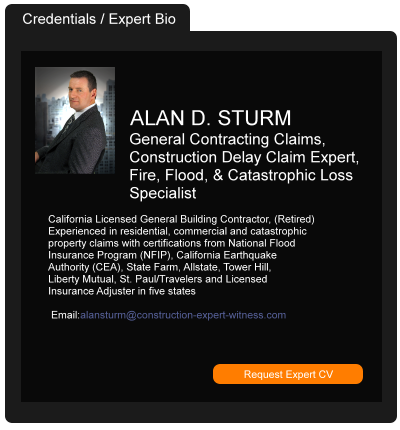Defining Constructive Acceleration
March 22, 2021 —
David Adelstein - Florida Construction Legal UpdatesWhen it comes to the definition of “constructive acceleration,” the case of Fraser Const. Co. v. U.S., 384 F.3d 1354 (Fed.Cir. 2004) is a cited case and contains an instructive definition, quoted below, for proving a constructive acceleration claim.
In a nutshell, a constructive acceleration claim is when the contractor incurs added costs for trying to complete the contract on time when it should be provided extensions of time to perform based on excusable delay (i.e., delay not caused by the contractor). These added costs could be bringing in additional supervision to manage the work, adding manpower to perform the work, working overtime, working weekends, adding more shift work, stacking trades, etc. However, just because a contractor claims they have been constructively accelerated does not make it so. The contractor has to actually ask for an extension of time based on an excusable delay and the owner either denied the extension or unreasonably sat on the request for an extension of time; thus, the contractor incurred significant costs to accelerate in order to finish the project on time because it was deprived of a requested time extension for excusable delay.
Read the court decisionRead the full story...Reprinted courtesy of
David Adelstein, Kirwin Norris, P.A.Mr. Adelstein may be contacted at
dma@kirwinnorris.com
New Evidence Code Requires Attorney to Obtain Written Acknowledgement that the Confidential Nature of Mediation has been Disclosed to the Client
January 02, 2019 —
Steven J. Pearse, Esq. & David A. Napper, Esq. – Chapman Glucksman Dean Roeb & BargerSenate Bill 954: MEDIATION CONFIDENTIALITY DISCLOSURES.
California regards mediation as a beneficial process for parties to resolve disputes in an expeditious and economical fashion. To assure open and candid participation, there is a longstanding policy in California to maintain confidentiality during the mediation process. However, the mediation confidentiality statutes have prevented some clients from suing their·attorneys for alleged malpractice that occurred during the mediation process. (see Cassel v. Superior Court, (2011) 51 Cal.4th 113). Senate Bill ("SB") 954, was recently passed and thereafter approved by the Governor on September 11, 2018 to address this concern.
SB 954, which will amend California Evidence Code section 1122 and add California Evidence Code section 1129, requires that an attorney representing a client participating in a mediation or a mediation consultation provide that client with a written disclosure and acknowledgement containing the mediation confidentiality restrictions as set forth in the California Evidence Code.
This written disclosure and acknowledgement requirement does not apply to class or representative actions. Additionally, the failure of an attorney to follow the new requirement will not be a basis to set aside an agreement prepared in the course of, or pursuant to, a mediation. Any communication, document, or writing related to an attorney's compliance with the disclosure requirement will not be considered confidential and may be used in a disciplinary proceeding if the communication, document, or writing does not disclose anything said or done or any admission made in the course of the mediation.
California Evidence Code section 1129 sets forth the exact language that must be used in the disclosure. It even informs the client that all communications between the client and the attorney made in preparation for a mediation, or during a mediation, are confidential and cannot be disclosed or used (except in extremely limited circumstances), even if the client later decides to sue the attorney for malpractice because of something that happens during the mediation.
The new disclosure requirement will allow mediation to maintain the confidentiality that encourages open and candid communications during the process while ensuring that before clients agree to mediation that the clients are made aware of how that confidentiality can potentially impact them. SB 954, will take effect on January 1,2019.
Reprinted courtesy of
Stephen J. Pearce, Chapman Glucksman Dean Roeb & Barger and
David A. Napper, Chapman Glucksman Dean Roeb & Barger
Mr. Pearce may be contacted at dnapper@cgdrblaw.com
Mr. Napper may be contacted at jpaster@HuntonAK.com
Read the court decisionRead the full story...Reprinted courtesy of
Colorado General Assembly Sets Forth Prerequisites for an Insurance Company to Use Failure to Cooperate as a Defense to a Claim for First Party Insurance Benefits
August 10, 2020 —
Christine Kroupa, John Palmeri & Katelyn Werner - Gordon & ReesDespite first party insurance policies generally requiring cooperation from an insured in the investigation of a claim, insurers can no longer rely on the failure to cooperate as a defense in a claim for first party insurance benefits in Colorado unless certain conditions are met.
The Bill:
On July 2, 2020, Colorado Governor Jared S. Polis signed House Bill 20-1290 which addresses the ability of an insurer to use a failure to cooperate defense in an action where the insured has made a claim for benefits under an insurance policy. This bill bars an insurer from raising the failure to cooperate unless the following conditions are met:
- The insurer submitted a written request to the insured or the insured’s representative for the information (via electronic means if consent was given by insured or insured’s representative, or via certified mail);
- The information is not available to the insurer without the assistance of the insured;
- The written request provides the insured 60 days to respond;
- The written request is for information a reasonable person would determine the insurer needs to adjust the claim filed by the insured or to prevent fraud; and
- The insurer gives the insured an opportunity to cure, which must:
- Provide written notice to the insured of the alleged failure to cooperate, describing with particularity the alleged failure within 60 days after the alleged failure; and
- Allow the insured 60 days after receipt of the written notice to cure the alleged failure to cooperate.
Reprinted courtesy of Gordon & Rees attorneys
Christine Kroupa,
John Palmeri and
Katelyn Werner
Ms. Kroupa may be contacted at ckroupa@grsm.com
Mr. Palmeri may be contacted at jpalmeri@grsm.com
Ms. Werner may be contacted at kwerner@grsm.com
Read the court decisionRead the full story...Reprinted courtesy of
Construction Job Opening Rise in October
December 20, 2012 —
CDJ STAFFThere was a significant increase in the number of open construction jobs during October, according to a report for the National Association of Home Builders. Working from preliminary data provided by the Bureau of Labor Statistics, the NAHB said that the number of open positions reached “levels and rates last seen in 2007.” As the data is still preliminary, the NAHB noted that the conclusions should be taken with caution.
While there was a spike in job openings, the hiring of people to fill these positions hasn’t caught up with it, and there was a small decline in hires. But to return to the good news, there was also a drop in layoffs in that same period.
Through October, about 8,000 people have been hired in the construction sector. The NAHB notes that this does not correspond with the recent increases with home construction. They suggest that “it may be the case that startups in the home building and remodeling sectors are being missed by the establishment survey.” Another possibility they raise is that already-employed construction workers are simply working more hours.
Read the court decisionRead the full story...Reprinted courtesy of
Don’t Miss the 2015 West Coast Casualty Construction Defect Seminar
April 01, 2015 —
Beverley BevenFlorez-CDJ STAFFThe 22nd West Coast Casualty (WCC) Construction Defect Seminar returning to the Disneyland Hotel in Anaheim, California is just six weeks away.
The annual event begins on Thursday, May 14th, with breakfast and registration starting at 7:30am. Panel discussions on various construction defect related topics begin at 8:30am and continue through the morning and afternoon, followed by a cocktail reception in the early evening. The following day includes break-out sessions with the event concluding in the afternoon.
Attendees can enhance their seminar experience with the WCC Construction Defect Seminar Mobile App. The event schedule, speaker information, product information, sponsor details, and interactive floorplan can all be accessed through the app. Furthermore, registered attendees will have access to session presentations.
The discounted, early registration ends April 15th, 2015.
Download an Invitation and Register for the Event...
Read the court decisionRead the full story...Reprinted courtesy of
Insurer Beware: Failure to Defend Ends with Hefty Verdict
June 01, 2011 —
Douglas Reiser, Builders Council BlogServed with a lawsuit that you turned over to your insurer? Insurer refusing to defend you? Well, find some hope in this news. Washington’s IFCA has the claws to ensure that insurers perform their duties.
�Contractors heavily rely on the defense provisions of their Commercial General Liability (CGL) policies. In construction, a legal dispute can easily rear its head when you least expect it. Luckily, Washington registered contractors are required to maintain CGL insurance. That insurance often provides contractors with adequate legal defense in the event that they are sued.
�But, what if your insurer turns down the defense request? They might be staring at massive damages. A current Reiser Legal client, Australia Unlimited, Inc., recently won a large verdict against Hartford Insurance, after the insurer unreasonably denied their claim. The firm who represented Australia Unlimited Inc. in that case, Hackett Beecher and Hart, were successful in procuring a $5.43 Million verdict
�Read the full story…
�Reprinted courtesy of Douglas Reiser of Reiser Legal LLC. Mr. Reiser can be contacted at info@reiserlegal.com
Read the court decisionRead the full story...Reprinted courtesy of
Florida’s Construction Defect Statute of Repose
August 24, 2017 —
David Suggs – Bert L. Howe & Associates, Inc.Butler Weihmuller of Katz Craig LLP discussed Florida’s 10-year statute of repose law: “Under § 95.11(3)(c), the action must commence within 10 years after the date of actual possession by the owner, the date of the issuance of a certificate of occupancy, the date of abandonment of construction if not completed, or the date of completion or termination of the contract between the professional engineer, registered architect, or licensed contractor and his or her employer, whichever date is latest.”
However, Weihmuller explains that parties may disagree on the specific date For instance, in Busch v. Lennar Homes, LLC, Florida’s 5th DCA recently “reversed a trial court’s dismissal of a homeowner’s construction defect claim that was filed just beyond 10 years after the closing date on the property.” The previous decision had been based on the notion that the contract had been completed upon the date of closing. The 5th DCA declared that “a contract is not completed until both sides of a contract have been performed” and “pointed to the ‘inspection and punch-list clause’ of the contract.” The clause indicated that “[a]ny remaining items that Seller has agreed to correct will be corrected by Seller at Seller’s sole cost and expense prior to closing or at Seller’s option within a reasonable time after closing.” Since not all punch-list items had been completed prior to closing, the 5th DCA held that the contract had not been completed at closing, and therefore the statute of repose did not begin until the punch-items had been accomplished.
Read the court decisionRead the full story...Reprinted courtesy of
Taking Care of Infrastructure – Interview with Marilyn Grabowski
February 06, 2019 —
Aarni Heiskanen - AEC BusinessMarilyn Grabowski leads Atlantic Infrared with a mission to protect and improve infrastructure. In this interview, we discuss her professional background, the technologies that her team uses, and why more women should consider construction as a career.
Marilyn Grabowski, known as “The Lady in Red”, and her team Atlantic Infra employees dubbed “The Red Crew” have been seamlessly filling potholes across the state of New Jersey since 2002. Under her leadership, The Red Crew uses infrared technology and unfailing attention to detail to expertly repair potholes, failed utility cuts and sunken trenches with no break in the road – creating safe and aesthetically pleasing repairs statewide, at a clip of 15,000 potholes per year.
Read the court decisionRead the full story...Reprinted courtesy of
Aarni Heiskanen, AEC BusinessMr. Heiskanen may be contacted at
aec-business@aepartners.fi


































































